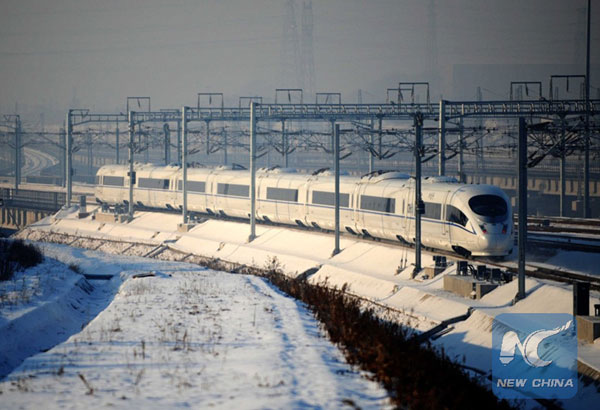
A file photo shows a high-speed train, independently developed by China, departs from the Harbin West Station, NE China's Heilongjiang Province.
Ways to keep the economy steady through structural reforms are said to be the focus as leading Chinese officials continue to meet in Beijing as part of the annual Central Economic Work Conference.
A new economic report compiled by Renmin University, which has been presented at the sessions, is warning China's economic growth will continue to dip next year.
The report says the transition from an investment-and-export driven model towards innovation and consumption is going to continue to drag down heavy industry and export-oriented businesses.
Sany Heavy Industry Vice-President He Dong says companies like his are moving to try to adapt to the changing times.
"We are realizing internationalization, with Chinese heavy-industry products making up around one-third of the international market. I think more is going to be dfone to invest in the global market. But at the same time, the economic transformation is a chance to upgrade our manufacturing through things like the internet. At the same time, an emphasis on areas such as new energy can also create opportunities."
Professor Liu Qiang with Beihang University says the government should be taking steps to weed-out companies which have continued to profit on low-end, low-quality production.
"There is a serious gap between the excess low-end capacity and the lack of high-end product supplies. More needs to be done to transform low-end production into higher-end, which can be cost-effective. In addition, more should be done to deal with manufacturing services. We need to create more of our own core technology."
The Chinese government has been trying to take the economy down a new, 3rd path for the past few years.
Following the founding of the PRC in 1949, a command-economy structure was formed, with a focus mostly on heavy industry to pull the country out of poverty and allow it to compete with other global economies.
Reform and Opening up in the 1980's saw China quickly become the world's factory, with companies attempting to cash in on low labor costs by divesting into lower-end manufacturing.
Today, the Chinese government is hoping to turn the economy into one driven by services and innovation.
Economist Li Yining says this transition is going to take some time.
"Innovation can't be achieved instantly; it's a process. But as long as we are pointed in the right direction and put more emphasis on quality, efficiency and education, I believe China's economic growth will remain healthy."
The Chinese economy has expanded by 6.9 percent year on year through the first three quarters of 2015.
Most expect the Chinese economy to grow from around 6.5 to 6.8-percent next year.





